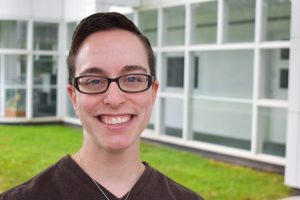The six students in our 2018-19 class of International Peacemaking Program fellows will spend a year at Hartford Seminary studying mediation, interfaith dialogue and public speaking while earning a Graduate Certificate.
We asked each of them to answer the same set of questions.
Q. Briefly tell us about your educational background
A. I studied both Documentary Studies and Production, and Anthropology at Ithaca College from 2010-2014.
Q. How did you learn about Hartford Seminary’s International Peacemaking Program?
A. I first heard about Hartford Seminary’s International Peacemaking Program through a friend. I had been contemplating going to seminary for a few months at the time, in particular taking classes at Hartford Seminary because it was close to home. Applying seemed like the perfect opportunity to not just talk about it, but be about it!
Q. Why are you interested in learning about peacemaking?
A. I am interested in learning about peacemaking because I think our society is lacking in productive, civil discourse. It is essential for people with diverse opinions and backgrounds to have constructive conversations which can lead to positive behavioral, social and political change. I am optimistic that diverse groups of people can pray together, work together, and live together. It can be frightening to imagine engaging in this type of dialogue, but with the right set of tools, patience, and an open mind, anyone can make what seemed impossible possible.
Q. How do you hope to use your skills after a year of training as a peacemaker?
A. I hope to bring the mediation skills and knowledge I’ve learned after a year here to my hometown and church. I believe peace-building should be included in the mission of the church in conjunction with social justice and outreach. I grew up in Simsbury, Connecticut — a predominantly white, wealthy suburb with excellent educational opportunities. At the church I attend, First Church of Christ in Simsbury, we travel to Hartford with our youth groups to work at soup kitchens or assist local organizations with home-building projects. When one lives in a privileged neighborhood, it is challenging to comprehend how traveling a half hour away into Hartford can put one in an entirely different economic landscape. The plight of the people living a few miles away is largely invisible to Simsbury residents. In one of my classes, Introduction to Black Theology, we are learning about James H. Cone’s liberation theology and the idea of God as a liberator of the oppressed. I would like to learn more about this subject so I can learn how to incorporate liberation theology into the way we ‘do’ church so we can become better Followers of Christ and better community builders.
Q. Tell us a little about your home country and the inter-religious conflict it faces.
A. I am from the United States where cultural, economic, and religious diversity is plentiful. The United States is very polarized when it comes to particular beliefs and opinions, especially regarding religion and politics. Although it has been seventeen years since 9/11, Islamophobia continues to affect relationships in our country. Most recently, the Muslim Ban and anti-immigration policies have added to anti-Muslim sentiments. Within Christianity, there is a great division between fundamentalist ideas and more liberal theologies.
Q. Give us a quick description of your home life and any interesting facts about yourself!
A. I grew up in Simsbury, Connecticut, with my twin sister, mother, and two cats. I am very active as a youth advisor at my church, and am considering pursuing a career in youth ministry. In my free time, I love to read, play piano, hike around the local area, and visit my dad and stepmom in Rhode Island.

 Sign-up now ›
Sign-up now ›